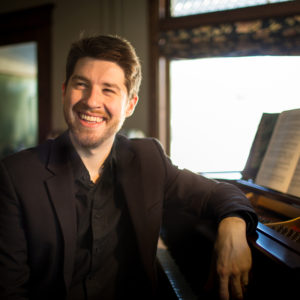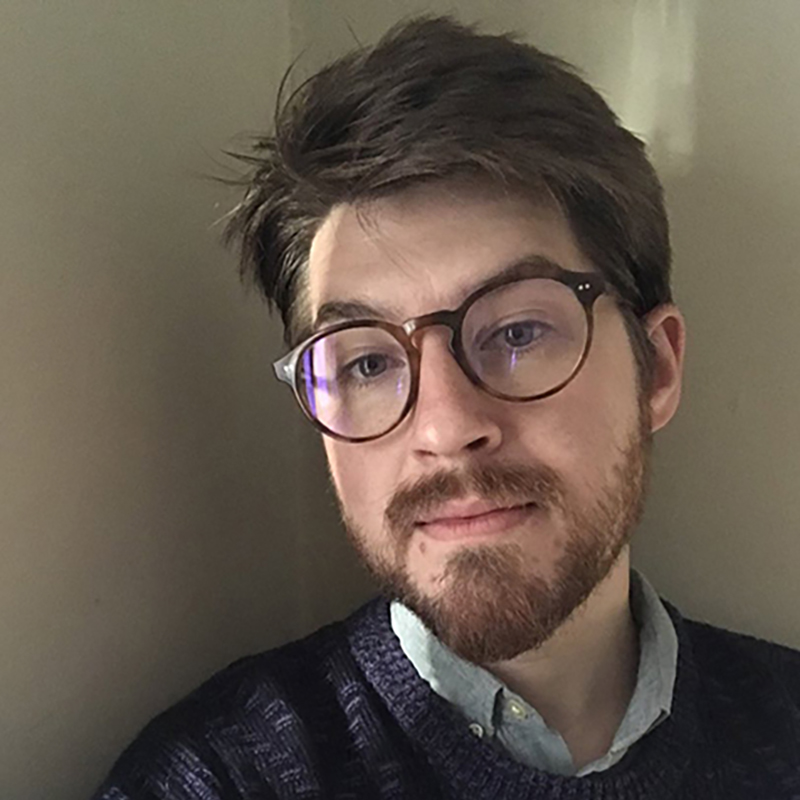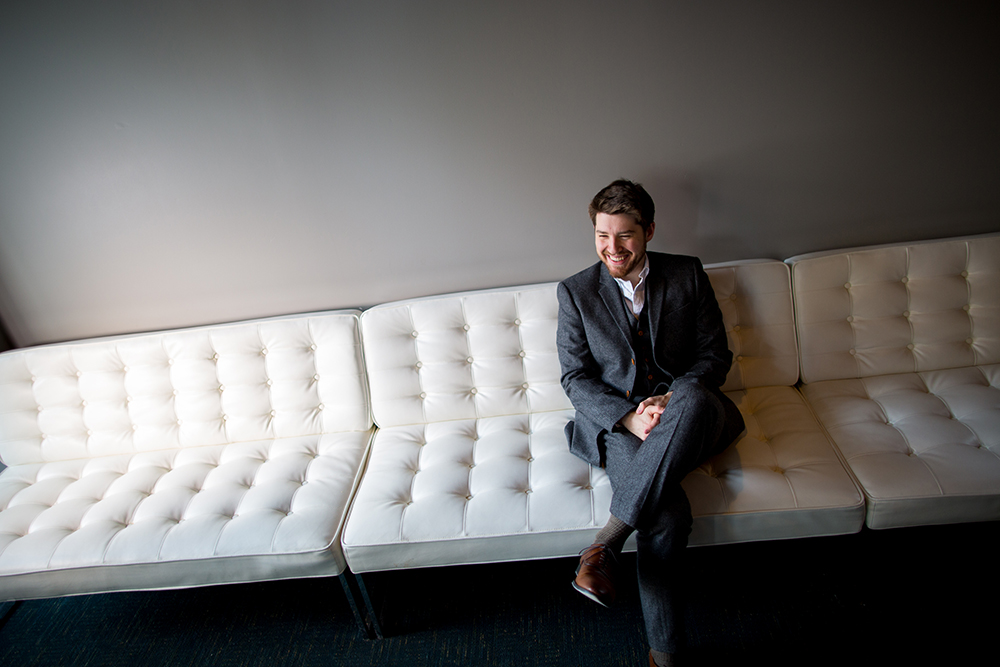Griffin Candey (DMA ’23, composition) is an American composer whose music has been praised for its “charming and elaborate complexity” and its “lyricism and emotional depth.” Recent and upcoming US and European outings include songs for soprano Tamara Wilson (Thundercloud Over Half Dome, premiering at Oper Frankfurt,) a TTBB work about toxic masculinity (Protocol) for Cantus Vocal Ensemble, and a chamber cello concerto (Facsimile), co-premiering with New Music Detroit, CHAI Collaborative Ensemble, and Citywater. Upcoming collaborations include a song project with bass-baritone Ryan McKinny, a Great Lakes-themed quartet for the American Wild Ensemble, and a string quartet for the Michigan-based Tuuli Quartet.
Describe the composers concert series. How did it come about and how is it different from what has been done in the past?
The Imprint Series came about as our attempt to ensure that this year—which has seen so many projects and festivals and things fall apart—could still offer opportunities for growth and collaboration. The creative team (Hannah Boissoneault, Alfredo Cabrera, Gala Flagello, Zan Huang, Ryan Lindveit, Yanchen Ye, and myself) agreed from the beginning that we didn’t want students to come away from this year saying, “well, I could have skipped that one.” There was (and is) still an incredible potential for creativity, and it simply required that we look outside of the box a little bit, move beyond the concert hall. We have tons of formats to explore, and we’re trying to facilitate those collaborations as often as we can (and as safely as we can!).
What inspires you as a performer/collaborator?
Being a Michigan kid for my whole life, I’ve always been really taken with the abundance of nature of the state. Being in green spaces is always the key to me moving past any creative blocks and getting things back on track. Other than that, people are the ones that usually inspire me: other people’s art, memories, stories, history—all the tidbits that come with being a person in community with other people.
Tell us about one of your mentors.
The mentor I’ve been with the longest is a British opera composer named Iain Bell. He’s an incredible artist and a very, very generous spirit, and he took me under his wing when I was a tiny composer baby who had nothing to show for himself, basically just an energetic speck with a lot of big ideas. He helped me translate those big ideas into real, actual things, and I’ll always be grateful to him for that.
What project(s) are you currently working on?
Oh, golly, probably too many. I’m in the throes of a viola sonata for a consortium of violists at the moment, as well as an Edna St. Vincent Millay-based song cycle for my friends Jocelyn Zelasko (soprano) and Bryan Hayslett (cello). A viola concerto and a larger Christmas cantata are on the docket next, but with so much instability looming in the next few years, I’m mostly focusing on what’s right in front of me!
What is special about Michigan?
The state? Everything: I love it to death, I would talk your ear off about it if given the time. The school? Also pretty much everything: the feeling I got when I came to visit SMTD, before I had even applied, was incredibly welcoming and warm, both from the faculty and the students. The environment here really, really encourages each person to find their voice and make it the absolute best that they can (something that’s unfortunately rare in composition degrees). Everyone wants the best for each other, wants to see each other succeed. It’s hard to oversell how special that is.
Have you adapted your artistic practice during the pandemic? Any unexpected opportunities?
Honestly, the adaptation has been in how I get myself to a place where I feel creative. With so many jarring things happening—macro and micro both in the world and our individual communities—it can be hard to get to a headspace where I can sit at the piano and give myself permission to write. I think it’s helped me slowly recognize that creativity can be a kind of meditative practice, something that I can get lost in for a while and see beauty in when it’s difficult to see beauty in other things.
 What does it mean to you to be an artist in these times?
What does it mean to you to be an artist in these times?
Phew, that’s a big question! I think that that’s a question that everyone has to answer for themselves, and it’s always changing. Does your art highlight societal shortcomings or injustices? Does your art make a space for folks to see themselves and their stories told? Is your art a way to tell your own story? Does your art act as a way to envision a brighter future? Is your art intended to soothe or instruct? (Or both, to different degrees?) There is room for all of the above, and it’s up to you to decide what you and your community—both local and global community—need.
What is something you learned about yourself in 2020 that you want to take forward with you in your life.
I think that everyone was forced to slow down—a lot— in the past 10 months, and that slowdown certainly helped me realize how quickly I was barreling forward, always trying to get things done and “achieve” things, often to the detriment of my physical and mental well-being. Since then, I’ve been trying to leave space to rest, have fun, experience things, talk to people that I love, and make sure that everything that I “do” doesn’t happen at the expense of everything (and everyone) that makes me who I am.
What’s next for you?
This is my first of three years here at Michigan, and I’m looking forward to the next two so, so much. After that, hoping to keep the projects rolling and to teach. (We’ll see what the world looks like in 2023!).
Visit Griffen Candey’s website to experience some of his music.


